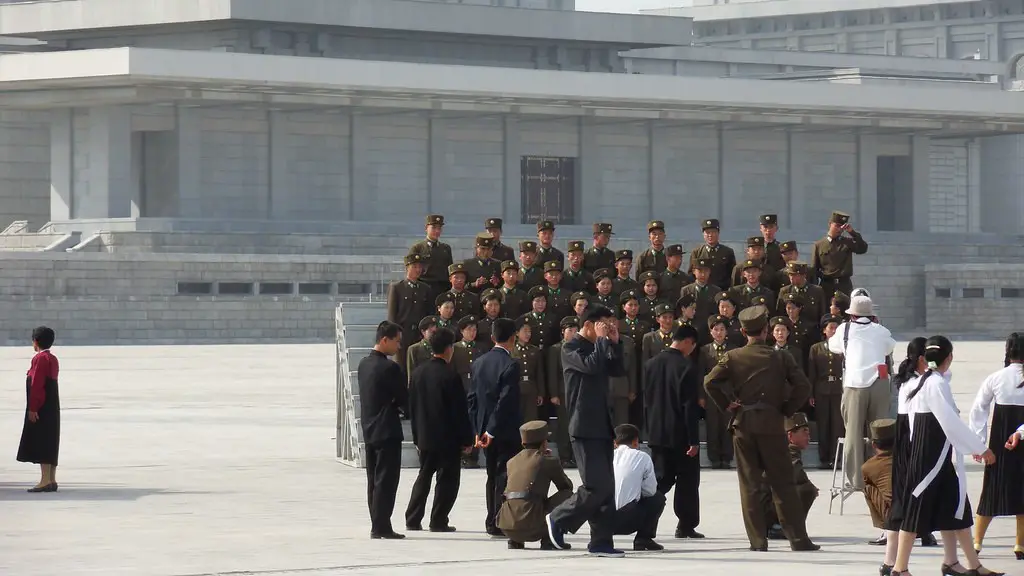Tensions between North Korea and the United States are approaching a fever pitch, as both countries remain lock in a dangerous game of brinkmanship. And with the US President Donald Trump making increased rhetorical and potential military threats to the North Korean regime, the question arises of whether a full-blown war is looming. The answer is complicated, but many experts agree that while the risk of direct war is low, the risk of full-blown nuclear conflict is high.
It is true that North Korea has long been a thorn in the side of the international community. Their rapid development of nuclear weapons and ability to deliver these weapons on long-range missiles has been a source of concerns for the United States for some time. In recent months, North Korea has been testing multiple ballistic missiles at a rapid pace, prompting a US sanction and rounds of angry rhetoric.
The reason why the risk of a full-blown war between North Korea and the United States is remote is largely because both countries understand the tremendous risks and costs associated with full-blown conflict. North Korea is a heavily militarized nation, and its ruling political elite is well aware of the tremendous losses it would suffer if it were to go to open war against the United States. Meanwhile, the United States is hesitant to deploy the kind of firepower against North Korea which would be necessary to win a full-scale conflict, for fear of triggering a retaliation from other countries in the region.
However, the danger that the tension between North Korea and the United States could lead to conflict is real. North Korean leader Kim Jong-un has been particularly belligerent in his statements, and the country has made threats of nuclear action against the United States. This has led to a heightened level of anxiousness in the region, as the US and its allies consider how to manage the increasingly unpredictable North Korean regime.
There are those who suggest that the best approach to managing North Korea is through diplomatic means. In fact, there have been attempts to open dialogue between North Korea and the United States, although so far these efforts have proven largely fruitless. In addition, China has attempted to act as a mediator in the conflict, although the results of this effort have been mixed.
Ultimately, the key to avoiding all-out war between North Korea and the United States is for both sides to find a way to manage their differences without resorting to violence. The stakes are incredibly high, and any missteps could have grave consequences. Therefore, both sides must be very careful in how they handle their respective positions in the current conflict.
What Initiated The Conflict?
The tensions between North Korea and the United States can be traced back to the Korean War of the 1950s. At the end of the war, a permanent ceasefire was established, but no final peace treaty was signed. This has left the two countries in a de facto state of war since then, and the mistrust between the two nations has built up over the years.
In recent years, North Korea has made significant progress in its nuclear weapons development, and its nuclear program has been a major point of contention between the two countries. The United States has made it clear that it will not accept a nuclear-armed North Korea, and has sought to impose economic sanctions and diplomatic pressure on the North Korean regime. North Korea, in response, has threatened retaliation if it feels its sovereignty is threatened.
Reactions From Other Countries?
The conflict between North Korea and the United States is not simply a bilateral one. Other countries are deeply concerned about the implications of a conflict in the region, and have sought to use their influence to try and deescalate the situation. China, for example, has long acted as an intermediary between the two countries, and has sought to encourage dialogue between the two sides.
Meanwhile, countries like Japan and South Korea have grown increasingly concerned about the possibility of war breaking out in the region. This has led to increased levels of military spending and deployments to the region, as well as stepped up diplomatic efforts in the hopes of finding a peaceful resolution to the conflict.
Effects On Global Economy
If war were to break out between the United States and North Korea, it is likely to cause a significant disruption to the global economy. The key issue is that North Korea is located in an area of high strategic importance, and many of the countries in the region are heavily dependent on trade routes through the Sea of Japan. Any sort of war in the region would disrupt those trade routes, leading to economic fallout throughout the world.
In addition, the United States, China and Russia all have significant economic interests in the region, and would be affected if war were to break out. There is also the risk of nuclear fallout, depending on the scale and scope of the conflict. All of these factors highlight the need for a peaceful resolution to the conflict between North Korea and the United States.
Possibility Of Peaceful Resolution?
The outlook for a peaceful resolution to the tensions between North Korea and the United States is uncertain. Many analysts suggest that sustained diplomatic efforts could be the key to averting a full-blown military conflict. China, in particular, plays a pivotal role in any potential negotiations, as North Korea remains heavily dependent on its only major ally.
The United States, meanwhile, has sought to impose economic sanctions and diplomatic pressure against North Korea in the hopes of persuading them to abandon their nuclear weapons program. This could be a viable option, although the results of such sanctions are hard to predict.
Many experts also suggest that a certain degree of patience is needed in order to allow the situation to deescalate organically. North Korea has already experienced several rounds of sanctions and diplomatic pressure, and it is likely that further pressure will be ineffective in changing the North Korean regime’s behavior.
Role Of UN?
The United Nations has an important role to play in the North Korea-US conflict. The organization has long sought to promote peace and dialogue between the two countries, and has repeatedly called on both sides to refrain from any escalatory actions. In addition, it has approved a series of economic sanctions against North Korea in order to try and persuade them to abandon their nuclear weapons program.
The United Nations has also attempted to set up a series of negotiations between the United States and North Korea to try and reach a peaceful resolution. However, these efforts have so far not been successful, and both sides remain deeply distrustful of each other.
Role Of Allies?
America’s allies in the region have an important role to play in deterring a full-scale war between North Korea and the United States. Countries like South Korea, Japan and the Philippines are all locked in a tense standoff with North Korea, and will be crucial in trying to defuse the situation. All of these countries have close military and economic ties to the United States, and their support will be essential in trying to contain the situation.
In addition, countries like China, Russia and India will also be important in trying to find a peaceful resolution to the conflict. These countries have close ties with North Korea, and could potentially play a role in trying to persuade the North Korean regime to abandon its nuclear ambitions.
Public Opinion On Conflict
The conflict between North Korea and the United States has been met with a great deal of anxiety from the international community. Many countries are deeply concerned that the situation could spiral out of control, leading to a full-scale war in the region. The conflict has also become a major topic in domestic political debates in the United States, particularly in light of the Trump administration’s rhetoric towards North Korea.
Meanwhile, the North Korean public remains largely in the dark about the tensions between their country and the United States, as the state-run media has largely been silent on the matter. This underscores the dangerous lack of transparency between the two countries, and highlights the need for greater dialogue between the two sides.
Overall, the international community remains deeply concerned about the risks posed by an escalation of the conflict between North Korea and the United States. The two sides remain deadlocked in a dangerous game of brinkmanship, and there are no easy solutions in sight. The hope is that through diplomatic efforts, a peaceful resolution can be found before a full-blown war breaks out.





